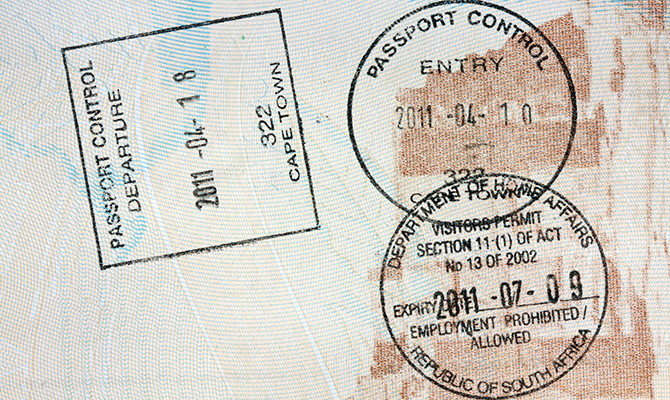
From Cape Town’s striking coastline to the winding riverine passageways of Botswana’s iconic Okavango Delta, southern Africa is a bucket-list destination for many travelers. Don’t let visa and travel regulations get in the way of your trip. To help you plan, we have assembled an easy guide detailing important travel requirements to get to southern Africa.
Some southern African countries require U.S. citizens to obtain a tourist visa in order to enter. It is important to understand the country-specific requirements Zambia, Malawi, Namibia, Madagascar, Zimbabwe, Mozambique, Botswana, and South Africa have before you depart.
Passport Validity
Passport validity is the first step to ensuring you don’t encounter any unwanted surprises at the border post. One’s passport must be valid for at least 6 months beyond the time of entry and you should have at least two consecutive blank pages per country you are visiting available in your passport. If your visa is not valid or does not have the appropriate number of consecutive blank pages, border officials can turn you away.
With that in mind, here are some general visa guidelines to follow for southern African countries:
Visa requirements for Southern Africa
Zambia: 90-day tourist visas can be applied for online through the Zambia Department of Immigration website. Single-entry visas can also be purchased for $50 USD at the port of entry.
Malawi: Single entry visas will be issued at the port of entry upon arrival for $75 USD. The Single entry visa is valid for up to 90 days.
Namibia: U.S. citizens can travel within Namibia for up to 90 days without a visa
Madagascar: Tourist visas will be issued upon arrival in Madagascar. A 60-day single entry visa will cost $41.57 USD.
Zimbabwe: U.S. citizens can only obtain a visa upon arrival, and must pay $30 USD for a 30-day single entry visa.
Mozambique: U.S. citizens traveling to Mozambique can download visa application forms from the Mozambique Embassy website, fill them out, and return to the embassy with 2 passport-sized photos, flight information, visa fees ($160 USD), valid passports, and hotel information. The turnaround time can be anywhere from 3 to 14 days.
Botswana: U.S. citizens can stay in botswana for up to 90 days without a visa, but minors require special documents to enter (see below)
South Africa: U.S. citizens can travel up to 90 days without a visa but there are strict regulations regarding minors (see below)
Travelers who would benefit from moving freely, with multiple entries, between Zambia and Zimbabwe (such as to visit both sides of Victoria Falls) can apply for the KAZA UNIVISA for $50 USD at specified border posts.
Visa requirements can change with short notice, making it advisable for American travelers to check the U.S. Department of State Bureau of Consular Affairs International Travel site for the latest travel documentation requirements for your country or countries of travel.
Special requirements
While visas are not age restricted in most countries, there are a few that have specific regulations regarding minors.
Botswana: A child traveling with both parents in Botswana must provide a notarized copy of their birth certificate along with a valid passport. If the child is only traveling with one parent, an affidavit consenting the travel is required in addition to the birth certificate copy and passport. Visit the Botswana Embassy website before traveling as regulations frequently change.
South Africa: South Africa has very specific rules in regards to traveling minors. The South African Department of Home Affairs website has the most up to date information on traveling with children, but these are their current regulations:
A minor must always provide: An unabridged birth certificate displaying the names of both parents in addition to a valid passport.
In addition to the above documents, the minor must provide:
- If traveling with both parents: The parents must also show their valid passports when presenting the child’s birth certificate to the customs officer.
- If only one parent is present: The absent parent must provide an affidavit and a copy of their passport.
- If the parents are divorced: The absent parent must provide an affidavit, a copy of their passport, and a copy of the divorce order.
- If the parent is widowed: A certified copy of the death certificate must be presented upon arrival.
- If the minor is traveling with an adult that is not their parent: The child must have an affidavit from both parents giving their consent to travel without them, as well as copies of their passports.
- If the minor is traveling alone: The person receiving the child in South Africa must provide a letter with their address and contact information as well as a copy of their identification card.
- If the minor is traveling with a legal guardian: The guardian must provide the court documents regarding their guardianship.
- If the father is unknown: The mother must provide an affidavit stating that she is entirely responsible for the child.
It is important to note that these regulations can change, so checking the South African Department of Home Affairs website beforehand is advised.
Best Practices
It is always good practice to keep multiple photocopies of your travel documents and passports, stored in different locations, in case anything gets lost or stolen. It is also advised to send a copy of your documents to a trusted friend or family member in case of emergency. Uploading your documents to your phone, tablet, computer, or email can also allow you to access them in case your photocopies get lost or damaged.
Applying for a visa does not have to be an intimidating process. Most countries have developed streamlined processes so that you spend less time at customs and more time enjoying all that the country has to offer.
———————–
Elevate Destinations specializes in designing bespoke travel experiences abroad that support communities, preserve ecosystems, and nurture cross-cultural connections for families, couples, groups, or solo adventurers.
